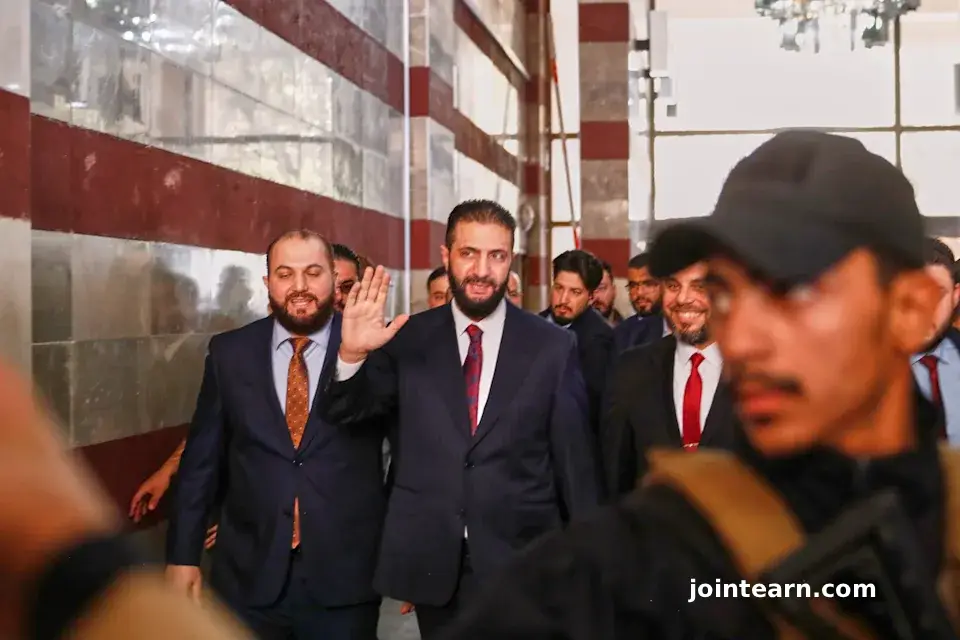
In a historic diplomatic milestone, Syrian interim President Ahmad al-Sharaa is set to become the first Syrian leader to visit the White House since Syria gained independence in 1946. Al-Sharaa’s rise from a former militant detained by U.S. forces in Iraq to the country’s presidency has been described as unlikely and remarkable.
From Militant to President
Two decades ago, Ahmad al-Sharaa was held in a U.S.-run detention center in Iraq after joining al-Qaida-affiliated militants fighting American forces. Since cutting ties with al-Qaida, al-Sharaa has led rebel forces that ousted former Syrian President Bashar Assad in December 2024, ending a 14-year civil war that followed Assad’s brutal crackdown on protests in 2011.
Al-Sharaa has since launched a diplomatic charm offensive, building ties with countries that shunned Assad’s government, including the United States and Saudi Arabia.
Key U.S.-Syria Engagements
Al-Sharaa previously met U.S. President Donald Trump in Saudi Arabia in May, where Trump announced he would lift decades of U.S. sanctions on Syria. Their Washington meeting is expected to focus on:
- Syria’s formal entry into the U.S.-led coalition against the Islamic State (IS).
- Efforts to permanently repeal remaining sanctions, including the Caesar Act, which targeted Assad’s government for human rights abuses.
Trump has expressed support for Syria’s sanctions relief, stating that al-Sharaa is “doing a very good job so far” and should be given a “fighting shot” to rebuild the country.
The Caesar Act and Congressional Challenges
While the Caesar sanctions are currently waived by presidential order, a permanent repeal requires congressional approval. Lawmakers are divided:
- Sen. Jeanne Shaheen (D) has pushed for full repeal.
- Some Republicans, including Rep. Brian Mast and Sen. Lindsey Graham, seek conditions on repeal, emphasizing:
- Protection of religious and ethnic minorities
- Maintaining peaceful relations with Israel
- Removal of foreign fighters from security institutions
Advocates argue that sanctions designed to pressure Assad should not penalize the new Syrian leadership, and that fear of Caesar snapback deters international investment in Syria’s reconstruction.
Addressing Humanitarian and Security Concerns
Critics caution about sectarian violence under al-Sharaa, noting incidents where pro-government Sunni fighters targeted Alawite and Druze minorities. Al-Sharaa has promised accountability for these attacks, while humanitarian groups, including Save the Persecuted Christians, have called for safe corridors in areas like Sweida and the Israeli-controlled Golan Heights.
Strengthening Military Alliances
Al-Sharaa is expected to sign an agreement to formally join the U.S.-led coalition against IS, aligning Syrian forces with more than 80 countries. While Syrian forces have already engaged IS cells, formal coalition membership would facilitate closer U.S.-Syrian military cooperation.
Prior to al-Sharaa’s presidency, he led Hayat Tahrir al-Sham (HTS), formerly linked to al-Qaida, and clamped down on IS operations in northwest Syria. Efforts are underway to merge the Syrian Democratic Forces (SDF) with the new Syrian army, though tensions have delayed full implementation.
International and Regional Implications
Al-Sharaa’s visit signals a major shift in U.S.-Syria relations:
- A potential lifting of long-standing sanctions to incentivize rebuilding and cooperation.
- Integration of Syria into the international anti-IS coalition.
- Opportunity to mediate regional security agreements, including those with Israel.
- Increased foreign investment and diplomatic engagement in post-war Syria.
Key Takeaways
- Ahmad al-Sharaa will become the first Syrian president to visit the White House since 1946.
- The visit follows his rise from former al-Qaida-affiliated militant to interim president.
- Expected outcomes include Syria joining the U.S.-led anti-IS coalition and pushing for Caesar Act repeal.
- Congress is negotiating conditions on permanent sanctions removal.
- Al-Sharaa faces internal challenges, including sectarian violence and minority protection.
- The visit represents a historic opportunity for Syria’s reintegration into international diplomacy and reconstruction efforts.


Leave a Reply